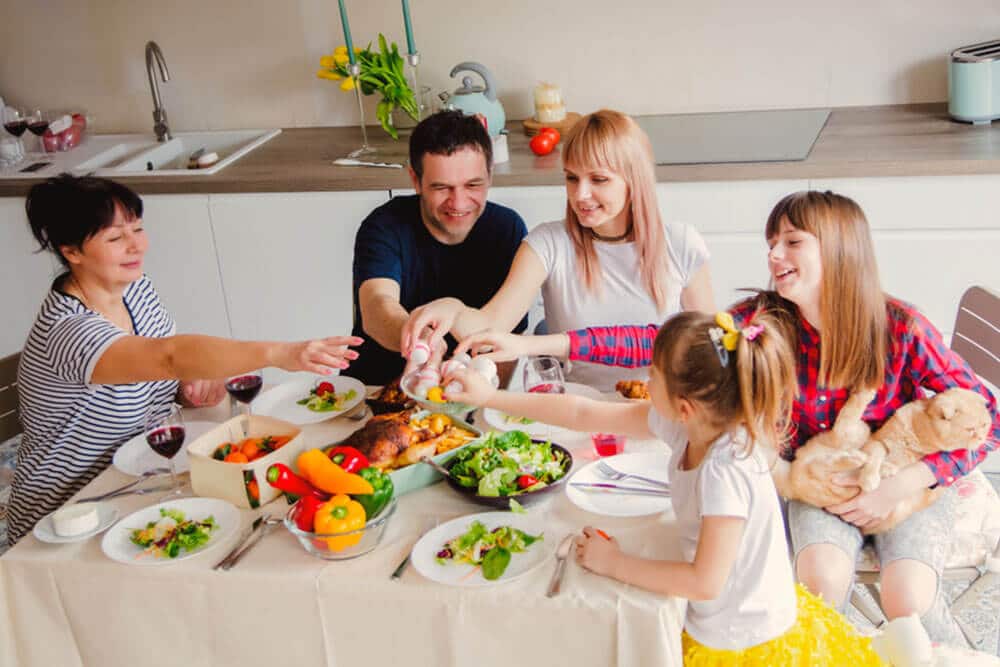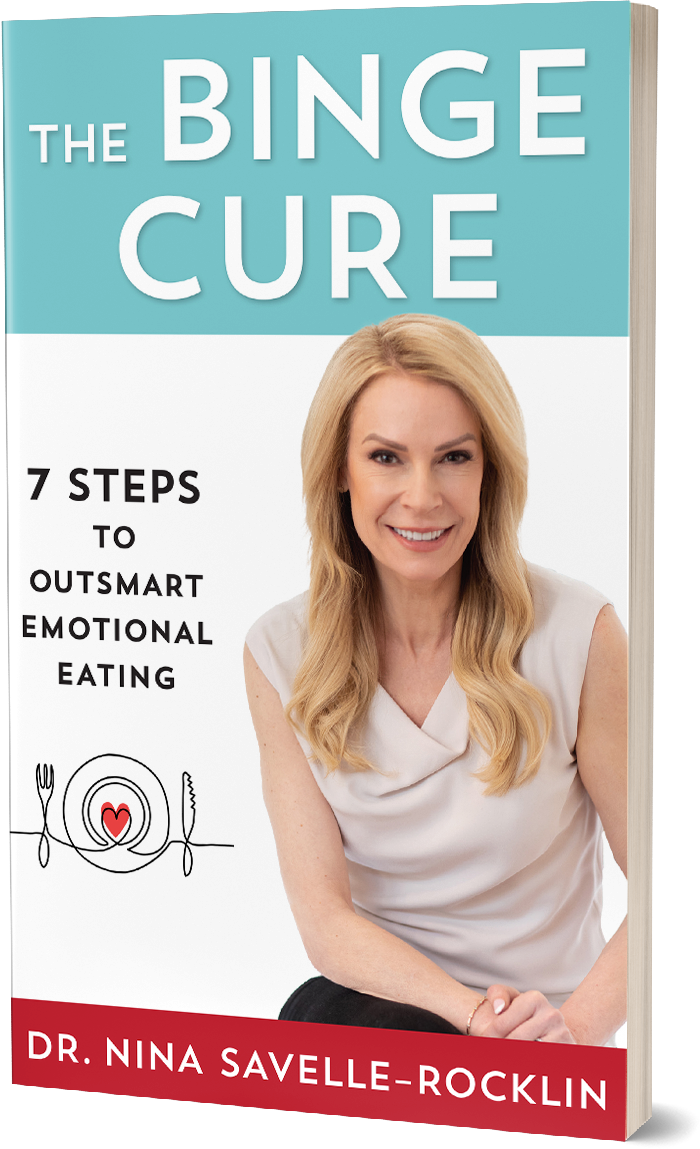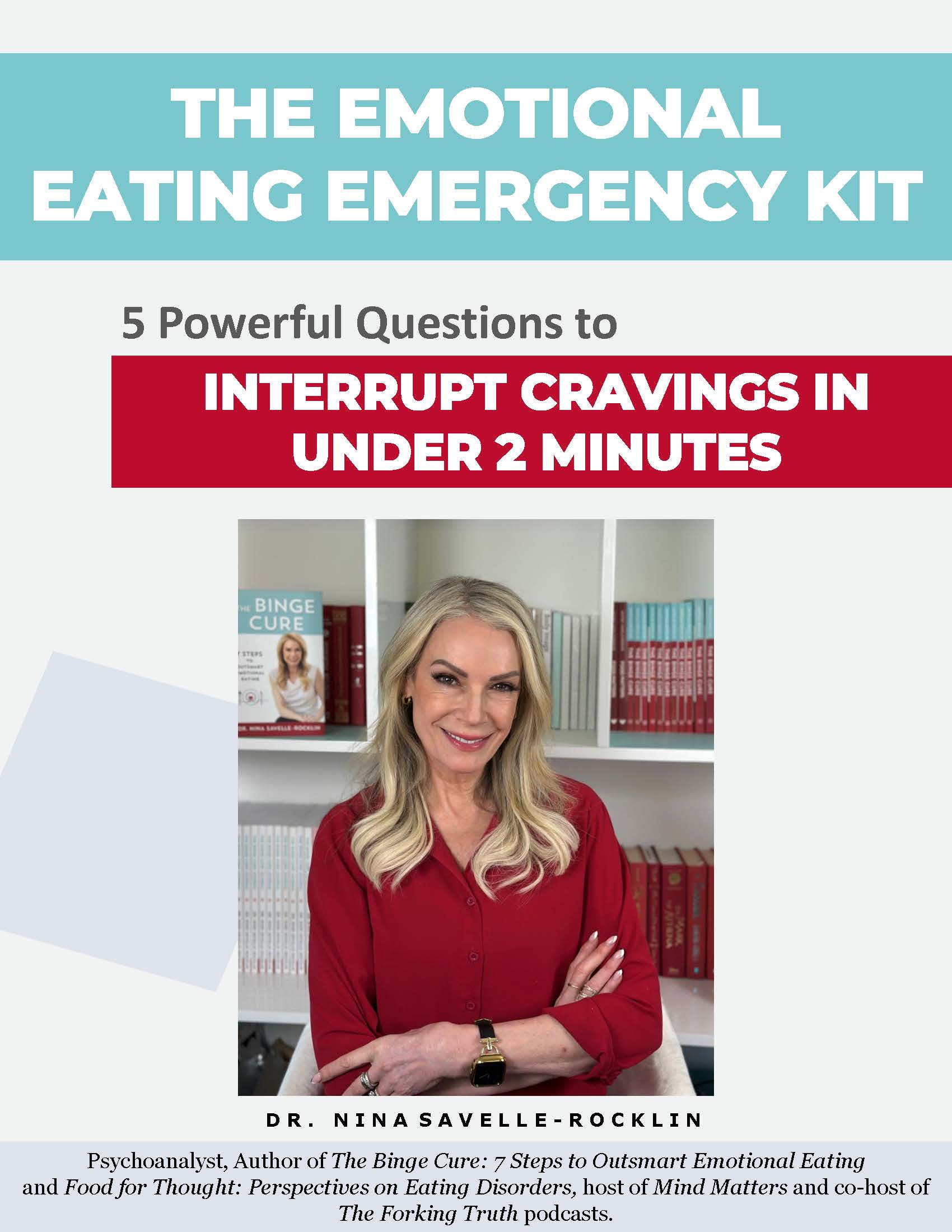Dr. Nina Savelle-Rocklin
Battling Binge Eating at the Family Table: Tips and Strategies for a Stress-Free Holiday Meal
Table of Contents
- Don’t restrict food before a meal
- Tips to feel safe around food
- Tips to feel safer with people
- Focus on the spirit of the holidays
During this time of Easter and Passover, many people look forward to celebrating those holidays with family and friends. Yet for those who struggle with their relationship with food, those celebrations can be overwhelming.

This year, the Muslim holy month of Ramadan also takes place around this time. Ramadan is a month of fasting during the day, which can be a trigger because restriction can lead to bingeing.
No matter what holiday you celebrate, these meals are challenging because food plays center stage. Meals with family can create anxiety and stress on many levels. In terms of food, thoughts of chocolate bunnies and matzoh can trigger feelings of guilt and fear about overeating, bingeing, and gaining weight.
These gatherings can also trigger memories of difficult past experiences or bring up tensions about unprocessed relationships. Pressure to meet social and familial expectations can create stress and anxiety.
Family members may also unknowingly (and sometimes knowingly) contribute to anxiety by making comments or judgments about food choices or weight, creating a toxic environment for those struggling with food.
The combination of all these factors can make holidays a difficult time and lead to emotional eating to cope. Here are some suggestions for how to make this time free of stress and binge-free:
Don’t restrict food before a meal
The temptation of all the delicious food on the table often creates a fear of overeating, leading many people to restrict their food intake before a meal. But this approach usually backfires.
Restricting food before a holiday meal can actually be counterproductive for both physiological and psychological reasons. If you don’t eat all day, you get so hungry that by the time you sit down to eat, you end up eating more because you’re so ravenous. Also, we usually want what we think we cannot have, so eventually, our willpower fails, and we end up overeating or bingeing.
This can lead to a sense of hopelessness or failure, making it even harder to break the cycle of binge eating disorder. Instead, approach holiday meals with a mindset of balance and self-care.
This means allowing yourself to enjoy the food and festivities without restriction or deprivation. Easier said than done, but possible.
Tips to feel safe around food
Instead of focusing on restriction and deprivation, approach holiday meals without restriction, giving yourself permission to eat what you want, which will make it easier to stop when you are full without stressing out.
One way to do this is by practicing mindful eating, which involves paying attention to your hunger and fullness cues and allowing yourself to enjoy food. For those who struggle with emotional eating, this can be challenging. Here are some strategies to cultivate a mindful mindset:
Slow down
Instead of rushing or furtively eating, take your time and reflect on how food tastes and whether it’s delicious or not. Take a moment to reflect on the level of the tastiness of the food. Notice your hunger and fullness cues and check in with your body before, during, and after eating to see how satiated you feel.
Be present
Pay attention to your thoughts and feelings as you eat. Notice if you're feeling anxious, stressed, or emotional, and try to be present with those feelings without judgment.
Practice self-compassion
Be kind and encouraging to yourself. Remember that emotional eating is not really about food–it’s a way of coping that involves eating for comfort, distraction, and escape.
Focus on the underlying reasons you want to eat instead of what you’re eating. Consider what’s eating “at” you and respond to yourself with interest and reassurance.
Be a friend to yourself
Consider what you’d say to a friend who was feeling self-conscious and worried about being with family or losing control over food. Give yourself the acknowledgment, validation, and support that you’d give someone else.
Tips to feel safer with people
Family members can be triggering for those struggling with binge eating disorder because family gatherings often involve large meals, traditional foods, and social pressure to participate in eating rituals.
Additionally, family dynamics can be complicated and uncomfortable. Undercurrents of unspoken expectations, unresolved conflicts, and emotional triggers can increase stress and anxiety. For those struggling with food, this can be a perfect storm of triggers that lead to binge eating as a coping mechanism.
Family members may also make comments about your eating habits or your body, which can make you feel uncomfortable, resentful, self-conscious, and sad, which also contributes to disordered eating. It's important to be aware of these triggers and to have strategies in place to cope with them in a healthy way. Here are some tips on how to deal with family members during these holiday meals.
Be clear and direct
When setting limits, it's important to be clear and direct about what you're comfortable with and what you're not. For example, if someone makes hurtful comments about your weight, justifying it by saying they’re just worried about your health, you can say, “I understand that you’re concerned, but comments about my weight are not helpful and make me feel uncomfortable. I would appreciate it if we could focus on other topics.”
Use “I” statements
Using “I” statements can help you communicate your needs without blaming or attacking the other person. For instance, instead of saying, “You always ruin family gatherings with your negativity,” you could say, “I feel upset when you make negative comments during family gatherings. I would appreciate it if we could keep the conversation positive.”
Set boundaries
Setting boundaries can help you protect your emotional well-being and prevent difficult family members from crossing the line. For example, you could say, “I'm not comfortable discussing my personal life with you right now,” or “I need some alone time to recharge. I'll join the group later.”
Practice active listening
Active listening involves focusing on the other person's perspective and validating their feelings, even if you don't agree with them. For instance, if someone is upset because you won’t try a piece of their famous Easter cake or one of their Passover cookies, and they say, “Just one bite won’t hurt you,” first speak to their emotions instead.
You can say, “I understand you’re upset and you really want me to taste your food, but…” and here are some options on how to finish the sentence:
- I'm trying to listen to my body and eat what feels good for me.
- I'm working on building a healthy relationship with food, and that means making choices that feel right for me.
- “I'm not comfortable with eating that right now, and I appreciate your understanding.”
Seek support
It's important to have a support system in place to help you navigate difficult family dynamics. This can include friends, a therapist, or a support group. They can offer emotional support and practical advice on how to cope with difficult family members or just listen and validate your experience.
Focus on the spirit of the holidays
If aliens landed on Earth, they might get the impression that Easter is a celebration of chocolate bunnies, egg hunts, and Easter baskets. Or that Passover only involves matzoh, sweet wine, and a lot of hand washing.
These celebrations, along with other religious and spiritual holidays, are about far more than food. One way of minimizing the stress around holiday meals is to consider the themes of these holidays that apply to our modern life:
Gratitude
This season encourages us to be grateful for what we have and to appreciate the blessings in our lives. The holiday encourages us to give thanks for the blessings in our lives and to recognize the hard work and sacrifices that have made our current freedoms and opportunities possible.
Overcoming adversity
The holidays' teach us that even when we are facing seemingly insurmountable obstacles, we can find the strength to persevere and ultimately triumph over our challenges.
Responsibility
With freedom comes responsibility. We are called upon to use our freedoms wisely, and to work toward making the world a better place for all.
Faith
These holidays remind us to strengthen our faith and belief in something greater than ourselves. It reminds us to have hope in the face of adversity and to trust that everything will work out in the end. Even when things seem hopeless, holding onto our beliefs and convictions can help sustain us through the darkest moments.
Faith doesn’t have to be religious. It can mean believing or trusting in something or someone, including ourselves. This type of faith means approaching life with positivity and resilience, even when things are tough. It's about believing in yourself and your ability to overcome obstacles, as well as being willing to take risks and pursue your goals despite any potential setbacks.
Whether religious or secular, faith is a source of comfort in difficult times, helping you to stay optimistic and keep moving forward.
Unity
The Passover seder and the Easter brunch, as well as breaking the Ramadan fast, is a time when families and communities come together to celebrate and reflect. This emphasis on togetherness reminds us of the importance of supporting and caring for one another, especially during challenging times.
Hope
These holidays are about the power of tenacity and belief. They remind us that even in the darkest times, there is always hope for a brighter future and that we can begin again.
Generosity
Ramadan encourages Muslims to be generous and charitable, particularly towards those in need. This can be applied to our modern lives by finding ways to give back to our communities, whether it's through volunteering, donating to a charity, or simply being kind to others.
These are powerful reminders that allow us to have hope in the face of adversity and to have faith in our ability to overcome even the greatest of challenges.
There are several ways to can get through holiday meals without emotional eating. When we allow ourselves to eat all foods in moderation, we can make more balanced choices. Learning to speak up for ourselves and set boundaries is empowering, and leads to greater ease at family get-togethers.
And, by celebrating the spirit of the holiday, we can enjoy the traditions and festivities of the holiday season without sacrificing our mental or physical health.

Sick of obsessing about every bite?
GET THE CURE
The Binge Cure Book!
Enter “CURE” to receive a 20% discount.
I’d love to conquer binge eating by ordering Dr. Nina’s book, The Binge Cure!
No, I don’t want access to this terrific resource to help me overcome binge eating.
The Author

Dr. Nina Savelle-Rocklin is a renowned author and podcast host and one of the nation’s leading psychoanalysts known for the psychology of eating. Her signature message of, “It’s not what you’re eating, it’s what’s eating ‘at’ you” has resonated with hundreds of thousands of listeners from around the globe in 40 countries. As founder of The Binge Cure Method, she guides emotional eaters to create lasting food freedom so they can take back control of their lives and feel good in their bodies.
Related Blogs




















